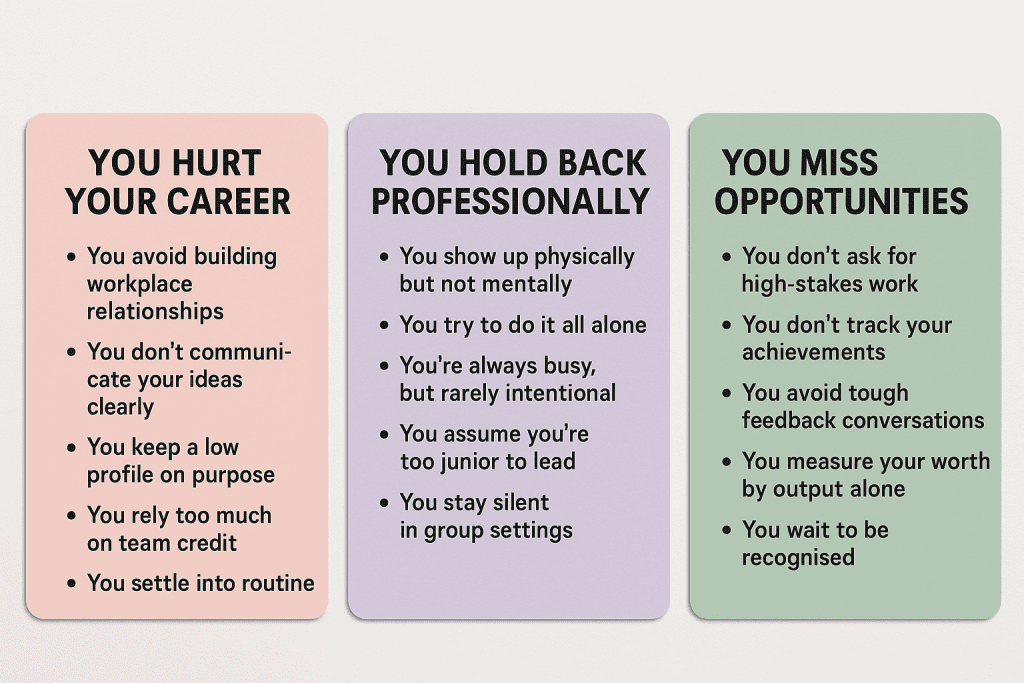Have you ever felt like you keep showing up at work, doing your best, but for some reason, you remain invisible to your bosses and even colleagues?
Well, this is a feeling that many Kenyan workers know too well, especially those in white-collar jobs and with prospects of getting a promotion and a salary raise.
Bizna Kenya contacted James Ogweno, Senior Consultant-Human Resource at PKF Consulting (K) Limited, who stated that invisibility at the workplace is a common phenomenon that usually ends up stiffling career dreams if not checked.
This invisibility often stems not from lack of talent, but from subtle workplace habits that hide an employee’s true value.
Ogweno explained habits that keep good employees in the shadows and provided practical insights about what you can do about them.

1. You wait to be recognised
Good work doesn’t automatically get noticed. If you assume your results will speak for themselves, you’re likely to stay invisible at your place of work.
Ogweno advised that, you need to make your achievements known. Update your manager on wins, share your progress in team meetings and if possible, create a monthly summary of what you’ve accomplished.
Ogweno explains: “Hard work doesn’t always speak for itself. Employees who never share their wins risk being overlooked. Section 5 of the Employment Act, 2007 underscores the principle of fairness and opportunity. To benefit, employees must also advocate for themselves, for example, by updating managers on milestones or taking opportunities to present their work.”
2. You measure your worth by output alone
Completing tasks is important, but if you only focus on getting things done without connecting your work to bigger outcomes, you risk missing the bigger picture.
It’s important to show your impact. Connect what you do to results that matter to the business. Instead of saying “I processed 50 invoices or wrote 50 stories,” say “I processed 50 invoices, reducing payment delays by 30%, or “I wrote five stories that generated X money-generating leads for the business.”
3. You avoid tough feedback conversations
Most people don’t love criticism, and many of us and guilty of this. But avoiding feedback means you miss chances to grow and improve your visibility.
To be able to survive harsh realities at the workplace, you need to ask for real feedback regularly. Request specific examples. Find out what you need to do to move forward. True growth needs friction.
4. You don’t track your achievements
Memory fades fast in busy workplaces, and this means that if you don’t document your wins, they get forgotten quickly.
Keep a record of everything you accomplish. You can achieve this by writing down projects you’ve completed, listing all problems you’ve solved, and the goals you have hit. Evidence doesn’t fade like memory does.
5. You don’t ask for high-stakes work
Who doesn’t like being comfortable? But at workplaces, staying in your comfort zone keeps you safe but acutely invisible. If you only handle routine tasks, you won’t stand out. You will even miss out on the most trivial things, like office gossip.
As a person seeking growth and recognition, you need to seek out opportunities that will stretch your limits. But you’ll have to be ready to get uncomfortable. Ask for projects that challenge you and volunteer for cross-functional work. Growth doesn’t come from comfort.
Ogweno notes: “Many employees perform well but avoid learning new skills or stretching beyond routine tasks. Over time, this makes them blend into the background. Proactively pursuing training, mentorship, or certifications shows ambition and positions an employee for growth.”

6. You stay silent in group settings
Who is not guilty of this? You’ve even muted the job WhatsApp group and stashed it in the archived folder. You think that the group has too much unnecessary “politics and drama.” If this is you, then you need to rethink that move and remember that ideas don’t add value if no one hears them.
Staying quiet in meetings or forums makes you forgettable. Speak up, share your thoughts, and ask questions, and contribute to discussions. Even small comments show you’re engaged and thinking.
7. You assume you’re too junior to lead
Job titles don’t define leadership. If you wait for permission to take initiative, then you’re likely to wait forever. Own your lane, take charge of projects that are within your scope, and suggest solutions to problems. Remember that initiative beats title every time.
8. You’re always busy, but rarely intentional
Being busy doesn’t equal being productive; we all know that. If you’re constantly reacting instead of planning, you’re missing opportunities to make a real impact at your workplace.
The problem with constant busyness is that it prevents you from stepping back to see the bigger picture. You become reactive instead of proactive, and you handle urgent tasks but miss important ones.
Most importantly, you don’t have time to think about how your work fits into the larger company goals.
When managers look for people to promote, they don’t just want someone who can handle a heavy workload; please remember that. They want someone who can think strategically, prioritize effectively, and focus on work that drives real business results.
9. You try to do it all alone
Working in isolation limits your visibility even if you achieve your KPIs. If you never collaborate or ask for help, fewer people see what you can do.
You need to work with others and share credit. Your visibility further multiplies when others share your impact. And when bosses look for people to promote, they will go for collaborators and not lone rangers.
Ogweno emphasizes this point, saying: “Teamwork is essential, but when employees never highlight their individual role, they risk invisibility. Without arrogance, workers can document and communicate their specific contributions, especially during appraisals.”
10. You show up physically but not mentally
Are you the type of person who joins work Zoom calls, mutes the mic, and goes ahead to do their own thing without even listening in? This could be costing you. Just being present isn’t enough. If you’re going through the motions without real engagement, people notice over time, even if it’s over virtual meetings.
You need to bring your real presence and demonstrate genuine interest in your work and your colleagues. During those ‘boring’ Zoom calls, make an impact; you can even offer to pray (if it’s allowed at your workplace), ask questions, or be the person who reminds people about the meetings and issue summaries in case nobody has been designated for such tasks. People remember how you made them feel.
11. You settle into routine
Doing the same tasks the same way every day makes you blend into the background. To prevent predictability from being the cause of your peril, look for ways to improve processes. Suggest new approaches and take on different types of work when possible. Show you can adapt and grow in various roles.
12. You rely too much on team credit
Team success is great, but if you never highlight your specific role, your contributions get lost in the group achievement. During team wins, take that chance to acknowledge the specific role that you played that contributed to the team’s success. Also, during performance reviews, remember to clearly outline what you personally contributed to team successes. Performance reviews are critical and bosses use them to select candidates who qualify for promotion or even salary raises.
13. You avoid building workplace relationships
“Your colleagues are not your friends” is a popular saying in Kenya’s corporate space. But don’t take it too seriously to an extent that you dont foster any type of professional relationships. Focusing only on tasks while ignoring relationships limits your visibility across the organization.
Build genuine professional connections with colleagues, join workplace committees or social groups, and attend company events. If the events involve alcohol, avoid or partake with moderation. Be very strategic when it comes to networking within your organization, such as team building, job trips, and end-of-year parties, among others.
“Performance alone does not guarantee recognition. Employees who neglect workplace networks, staff forums, or mentorship opportunities often miss out on visibility. Building professional relationships ensures managers and peers notice your presence,” Ogweno advises.
14. You keep a low profile on purpose
Some people prefer to stay in the background, thinking it’s safer or more professional. This habit severely limits career growth.
Even if you think you’re in a toxic workplace, try your best to step up when opportunities arise. Volunteer for presentations and remember to share your expertise in meetings. Being visible isn’t about being loud; it’s about being valuable to your employer.
15. You don’t communicate your ideas clearly
Having good thoughts means nothing if you can’t express them effectively. It’s common to hear Kenyans joke that their English is only good before they open their mouth to communicate. This is true, but accepting to yield under this type of pressure is the problem.
You can rehearse your speech, write down the main points you would like to speak, and even read more about public speaking communication skills. Poor communication keeps your value hidden. Work on both written and spoken communication skills. Ultimately, remember to ask for feedback on how you communicate.
“Good ideas can be lost if they are not communicated well. Employees who fail to express themselves confidently in meetings or reports are easily overshadowed. Investing in communication skills, written and spoken, ensures contributions are recognized,” Ogweno states.
According to the HR expert, the path out of invisibility isn’t complicated, but it does require intentional action and dedication. You need to document your wins, communicate your value, and engage meaningfully with your work and colleagues.
He concludes by saying:
“Invisibility at work is not always about competence; it’s often about habits that mask ability. Employees who actively share their achievements, pursue growth, and engage with their workplace stand a better chance of being recognized. At the same time, organizations, guided by the Employment Act, 2007, should ensure fair systems where good work is visible and rewarded. After all, when employees shine, the whole organization thrives.”








